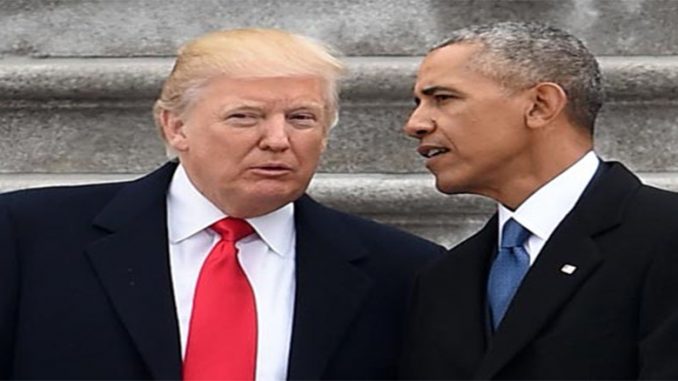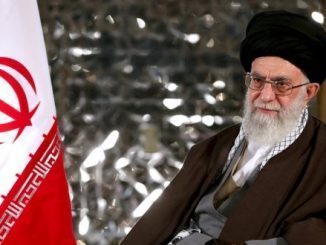
How the Obama administration watched the demise of Arab democracy — and paved the way for Trump’s embrace of dictators.
President Trump boasts that he has reversed American policies across the Middle East. Where his predecessor hoped to win hearts and minds, Mr. Trump champions the axiom that brute force is the only response to extremism — whether in Iran, Syria, Yemen or the Palestinian territories. He has embraced the hawks of the region, in Israel and the Persian Gulf, as his chief guides and allies, New York Times said in an analysis titled, “The White House and the Strongman”.
But in many ways, this hard-line approach began to take hold under President Barack Obama, when those same regional allies backed the 2013 military ouster of Egypt’s first elected president, Mohamed Morsi of the Muslim Brotherhood.
That coup was a watershed moment for the region, snuffing out dreams of democracy while emboldening both autocrats and jihadists. And American policy pivoted, too, empowering those inside the administration “who say you just have to crush these guys,” said Andrew Miller, who oversaw Egypt for the National Security Council under Mr. Obama, and who is now with the Project on Middle East Democracy. Some of the coup’s most vocal American advocates went on to top roles in the Trump administration, including Secretary of Defense James Mattis and Michael Flynn, Mr. Trump’s first national security adviser.
I was The New York Times Cairo bureau chief at the time of the coup, and I returned to the events years later in part to better understand Washington’s role. I learned that the Obama administration’s support for the Arab Spring uprisings had been hobbled from the start by internal disagreements over the same issues that now define Trump policy — about the nature of the threat from political Islam, about fidelity to autocratic allies like the United Arab Emirates and Saudi Arabia, and about the difficulty of achieving democratic change in Egypt and the region.
Mr. Obama and his closest advisers were often on one side of those debates. They hoped to shift established American policy and forge a new relationship with the Arab world in order to undermine the appeals of anti-Western extremism. Even in the final days before the takeover, Mr. Obama was urging respect for Egypt’s free elections. In an 11th–hour phone call he implored Mr. Morsi to make “bold gestures” to hold onto his office.
Most of his government, though, took the other side, reflecting longstanding worries about the intrinsic danger of political Islam and about the obstacles to Egyptian democracy.
In a White House meeting the day after Mr. Morsi’s ouster — two days after that last phone call — Mr. Obama yielded to those views when he accepted the military takeover. In doing so, he had taken a first step toward the policies that have become the overriding principles of the Trump administration.
‘He is the dumbest cluck I ever met.’
President Morsi, a leader of the Muslim Brotherhood, took office on June 30, 2012. He spent much of his energy struggling against resistance from an entrenched establishment — the soldiers, spies, police, judges and bureaucrats left in place from six decades of autocracy.
But he was an inept politician and he made his own mistakes, too. In November 2012, as part of a battle with the judiciary to push through a referendum on a new constitution, Mr. Morsi declared his own decrees above judicial review until it had passed. Many Egyptians, especially in Cairo, were angry at the new president for failing to fulfill the promises of the Tahrir Square uprising.
Saudi Arabia and the United Arab Emirates, whose rulers feared elections and dreaded them even more if they were presented as Islamic, lobbied hard to convince Washington that Mr. Morsi and the Muslim Brotherhood were a threat to American interests. And American officials later concluded that the United Arab Emirates were also providing covert financial support for protests against Mr. Morsi.
The United States provides $1.3 billion a year in military aid to Egypt, more than to any other country besides Israel, and after the uprising in 2011 the Pentagon boasted that its aid had helped convince the Egyptian generals to accept a transition to democracy. But by the spring of 2013, conversations between Egyptian military officers and their American counterparts were becoming mutual “bitch sessions” about Mr. Morsi, several of the Americans involved later told me.
Like others in the Pentagon, Mr. Mattis, then a Marine general in charge of Central Command, often argued that the Muslim Brotherhood was just a different shade of Al Qaeda — even though the Brotherhood had said for decades that it opposed violence and favored elections while Al Qaeda, in turn, denounced the Brothers as naïve patsies for the West. “They are all swimming in the same sea,” General Mattis later said in a speech looking back on the period. He blamed Mr. Morsi’s own “imperious leadership” for his downfall.
General Flynn, who has since pleaded guilty to lying to federal investigators under an agreement with the special prosecutor, headed the Defense Intelligence Agency at the time. He visited Cairo in the months before the coup to talk to the generals about Mr. Morsi. Whether the Brotherhood or Al Qaeda, “It is all the same ideology,” he told me in 2016.
Civilians in government were skeptical, too. Secretary of State John Kerry had grown close to many of the most fiercely anti-Islamist Persian Gulf royals during his decades in the Senate, even sometimes yachting with them. He had always distrusted the Brotherhood, he told me years later. When he visited Cairo for the first time as secretary of state in March 2013, he took an immediate dislike to Mr. Morsi.
“He is the dumbest cluck I ever met,” Mr. Kerry told his chief of staff as they left the presidential palace. “This isn’t going to work. These guys are wacko.”
Mr. Kerry got along better in his one-on-one meeting with Gen. Abdel Fattah el-Sisi. A former military intelligence chief, General Sisi had vaulted himself into the job of defense minister in a shake-up just a few months before.
“I will not let my country go down the drain,” General Sisi told Mr. Kerry, as he later recalled to me. He knew then that “Morsi was cooked.” General Sisi was prepared to intervene. Mr. Kerry felt partly relieved, he told me.
“It was reassuring that Egypt would not fall into a civil war or a complete massacre of the public or an implosion,” Mr. Kerry said, although he added, “I did not sit back and think, ‘Great, our problems are going to be solved.’”
Senior American diplomats in Cairo had told me that March that a military intervention was “extraordinarily unlikely.” But by the next month, Ambassador Anne Patterson was picking up other signals from the top generals. In an encrypted email, she warned at least some in the White House that “if not imminent, a coup was a high likelihood within a few months,” one official told me. She predicted that any military intervention would surely be brutal.
The White House was sending Secretary of Defense Chuck Hagel talking points intended to warn General Sisi that Washington would punish a coup. Among other things, United States law mandated a cutoff of aid to any military that overturned an elected leader.
‘I don’t live in Cairo, you do. You do have to protect your security, protect your country.’ Chuck Hagel, speaking to Gen. Abdel Fattah el-Sisi
But the message Mr. Hagel delivered “was totally, totally different,” a senior official on the National Security Council who read transcripts of the calls later told me. “The White House wanted the message to be ‘Democracy is important,’ and Hagel wanted it to be ‘We want to have a good relationship.’ We never could get him to deliver stern talking points.”
In an interview in early 2016, Mr. Hagel told me that he had been besieged by complaints about Mr. Morsi from Israel, Saudi Arabia and the United Arab Emirates. Mr. Hagel said that Crown Prince Mohammed bin Zayed al-Nahyan, the emirates’ de facto ruler and military chief, had called the Muslim Brotherhood “the most dangerous element afoot in the Middle East today.”
Pool photo by Jim Watson
Israeli leaders had said they were counting on General Sisi because they worried that — despite Mr. Morsi’s repeated pledges — the Muslim Brotherhood might threaten the border or help Hamas. And General Sisi himself had told Mr. Hagel that “there are some very evil, very bad forces afoot — you cannot understand it like we can understand it here.”
Mr. Hagel said he had agreed with them all and sought to reassure them: The Muslim Brotherhood “is dangerous — we recognize that,” Mr. Hagel said he told the Emiratis. “I don’t live in Cairo, you do,” Mr. Hagel said he had told General Sisi. “You do have to protect your security, protect your country.”
‘On an island in our own government’
On June 30, millions of protesters took the streets across Egypt to demand Mr. Morsi’s ouster. The next day, Egyptian Air Force F‑16s with colored contrails painted hearts in the sky over downtown Cairo. The generals were openly backing the protests.
President Obama was traveling in Africa, and on July 1, he spoke for the last time with President Morsi. The Egyptian military was not “taking direction” from the United States, Mr. Obama warned, according to a White House aide’s detailed record of the conversation. But he mainly urged Mr. Morsi to strike a compromise with his civilian opponents so that his presidency became “almost a unity government.”
Follow Nelson Mandela, Mr. Obama said. He had just visited Mr. Mandela’s sickbed and recalled his post-apartheid government in South Africa. “He even put his former prison guard — the man who had been the warden at the prison where he had been held — and he put him in charge of the security services. It was because of those gestures that he showed he was about bringing the country together,” Mr. Obama told Mr. Morsi. “Be bold,” he added. “History is waiting for you.”
“Very good advice, from a sincere friend,” Mr. Morsi answered. But it was too late. The military’s presidential guard had moved Mr. Morsi into its own base, ostensibly for his safety. Two days later, on July 3, 2013, General Sisi announced Mr. Morsi’s removal.
Mr. Kerry told me he had argued at the White House that Mr. Morsi’s removal was not, in fact, a coup. General Sisi had merely bowed to the public will in order to save Egypt, Mr. Kerry said, noting that the general had announced a plan for new elections. (Mr. Sisi was elected president the next year and again in 2018, each time with more than 95 percent of the vote.)
“In Egypt, what was the alternative? It wasn’t Jeffersonian democracy,” Mr. Kerry told me. “Over whatever number of years we have put about $80 billion into Egypt. Most of the time, this is the kind of government they had — almost all of the time. And the reality is, no matter how much I wish it was different, it ain’t going to be different tomorrow.”
The United States needed the Saudis, Emiratis and Israelis for other priorities, Mr. Kerry said, and he did not want to “get into a fight with them over something as historically clear as how Egypt works.”
President Obama decided not to make any determination about whether Mr. Morsi’s ouster was or was not a coup, effectively accepting it.
“The people who wanted to have a different kind of relationship with the Egyptian people, including the president, were on an island in our own government,” Ben Rhodes, Mr. Obama’s deputy national security adviser, later told me. “There was a sense of inevitability about the military resuming control.”
The Egyptian military crushed the opponents of the takeover with a series of mass shootings, culminating on Aug. 14, 2013, in the killing of as many as 1,000. Human Rights Watch concluded that it was the biggest single-day massacre in recent history, surpassing the Tiananmen Square massacre in 1989. Egypt’s police soon widened the crackdown to suppress independent liberal, leftist, feminist and Christian organizers as well. And a backlash against the takeover ignited an extremist insurgency centered on the North Sinai that continues today.
President Trump and his advisers have hailed Mr. Sisi as a model Arab leader. “A fantastic guy” who “took control of Egypt, and he really took control of it,” Mr. Trump said when he first met Mr. Sisi.
Mr. Mattis no longer contends that “imperious leadership” is a problem in Egypt. In a public talk before he became Mr. Trump’s secretary of defense, he celebrated Mr. Sisi for trying “to reduce the amount of negatives about the Muslim religion,” concluding that “it’s time for us to support him and take our own side in this.”
“The only way to support Egypt’s maturation as a country with civil society, with democracy,” he argued, “is to support President el‑Sisi.”
*By David D. Kirkpatrick, a former Cairo bureau chief for The Times and the author of a new book about Egypt and the Middle East.



